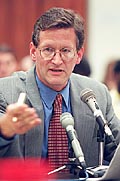By Rod Ohira
Advertiser Staff Writer
Capt. Kevin Lima, executive officer of the Honolulu Police Department’s Narcotics/Vice Division, watched the reaction of players during Tuesday night’s raid on an illegal baccarat operation on Ward Avenue.
 |
| Psychologist Timothy A. Kelly said gambling addiction is difficult to treat.
Cory Lum • The Honolulu Advertiser |
"Not everyone at these search-warrant raids is arrested," Lima said. "But typically, you’ll see those not arrested go outside and wait for us to leave so they can go back inside and gamble again.
"We’ve seized the equipment, but they know search warrants are a one-time thing and we won’t be back again that night," Lima said.
"It shows you how addicted they are to trying to win money, and that they cannot control themselves."
A 1997 Harvard University study estimates that 15.4 million Americans — more than half of them adolescents — are pathological gamblers, a national gambling expert said in an informational briefing at the State Capitol yesterday attended by about two dozen lawmakers.
Lima attended yesterday’s briefing and was reminded of what he had observed Tuesday night while listening to Virginia-based clinical psychologist Timothy A. Kelly’s comments on the negative impacts of legalized gambling.
Kelly, former executive director of the bipartisan National Gambling Impact Study Commission, said the National Academies of Science found that "pathological gamblers engage in destructive behaviors: they commit crimes, run up large debts, damage relationships with family and friends, and they kill themselves."
"Gambling addiction is classified as an impulse disorder but it is an addiction, even though it doesn’t involve an ingested substance," Kelly said. "And it’s very difficult to treat."
Kelly’s appearance was sponsored by the Honolulu Police Department and the Hawaii Coalition Against Legalized Gambling.
Members of the Keiki Caucus, a bipartisan group of 23 legislators, heard only the viewpoint of those opposed to legalizing gambling in Hawai‘i at yesterday’s briefing.
The Hawaii Coalition for Economic Diversity, which supports legalized gambling, is conducting a media blitz touting the potential benefits of gambling here, such as more money for education.
"There’s a lot of local pressure to come up with additional revenue without raising taxes, and gambling is a quick fix that’s being considered," said Rep. Dennis Arakaki D-28th (Kalihi Valley, Kamehameha Heights), who co-chairs the Keiki Caucus with Sen. Suzanne Chun Oakland, D-14th (Palama, ‘ülewa Heights).
"Leadership has told us to keep the option open," Arakaki added.
Hawaii is one of only three states — Utah and Tennessee are the others — without any form of legalized gambling, Kelly said.
"There are over 800 casinos operating in 28 states. The lottery is played in 37 states plus the District of Columbia," he added. "Gambling expansion has swept the nation, with revenues jumping from about $1 billion in 1980 to $50 billion today.
"That means Americans lose, on average, over $137 million every day of the year from gambling."
Kelly said a Louisiana survey of 12,000 teenagers found that 10 percent had bet on horse racing, 17 percent had gambled on slot machines and 25 percent had played video poker for money.
"Of particular concern is the fact that increasing numbers of children and adolescents are gambling," Kelly added. "Adolescent gambling is associated with alcohol and drug use, truancy, low grades, problematic gambling in parents and illegal activities to finance gambling."
In addition, Kelly said, the national study found that taxpayers often paid for the infrastructure costs of building a new casino and that there often is negative economic impact to neighboring businesses and an increase in crime.
Kelly recommends that the state do a comprehensive gambling impact statement, similar to an environmental impact statement, before making any move to legalize gambling.
"It will be costly and time-consuming," Kelly said. "And it has to be done by an objective third party.
"You need to find out the impacts gambling will have, not only on the economy, but on what is aloha. You don’t want to change the definition of what aloha is now."
[back to top] |

